Overview
Selling heavy equipment can be a challenge, but with the right strategies, it can also be incredibly rewarding. Have you ever thought about how leveraging eCommerce solutions could boost your sales? It’s all about using competitive pricing and strong communication to really connect with your customers.
For example, digital tools and online marketplaces can do wonders for your visibility and customer engagement. Imagine showcasing your equipment in a way that grabs attention! Plus, high-quality product presentation and flexible payment options can cater to a variety of buyer needs, making it easier for them to say yes.
So, what are you waiting for? Let’s dive into these effective strategies and see how they can transform your sales approach!
Introduction
In the competitive world of heavy equipment sales, success isn't just about having the right machinery. It’s about mastering a series of strategic approaches that can really boost your visibility and drive revenue.
Have you ever wondered how some sellers seem to thrive while others struggle? This article dives into nine proven tips that will equip you with the insights needed to navigate the complexities of this market effectively. From leveraging cutting-edge eCommerce solutions to optimizing pricing strategies, these actionable strategies promise to enhance your sales performance.
But with rapid technological advancements and ever-evolving buyer expectations, how can you adapt to not just meet but exceed market demands? Let’s explore together!
GenAlpha Technologies: Leverage eCommerce Solutions for Enhanced Sales
At GenAlpha Technologies, we understand the unique challenges faced by manufacturers and distributors in the heavy equipment sector. That’s why we offer a robust suite of eCommerce solutions designed just for you. Our Equip360 platform is here to help you enhance your online transaction capabilities, streamline inventory management, and elevate client experiences. Imagine boosting your revenue while building long-lasting customer relationships through exceptional service and operational efficiency.
Have you ever considered the impact of eCommerce on your revenue? Studies show that producers embracing digital tools can see up to an 80% shift in parts orders to online channels within just a year of implementation. Equip360 stands out by seamlessly integrating with your existing ERP systems, giving you real-time access to customer-specific pricing and inventory. This is crucial for enhancing your sales workflows and can lead to improved conversion rates, which average around 1.7% in the industry.
Industry leaders are stressing the importance of leveraging technology to improve the process of selling heavy equipment and boost online sales. As one expert put it, "Ecommerce is evolving into the central hub for interaction, particularly in the aftermarket." This highlights the need for businesses like yours to adapt to the changing expectations of consumers.
Current trends reveal that mobile devices account for a whopping 77% of online retail traffic. Isn’t that eye-opening? It underscores the necessity for distributors to prioritize mobile optimization in their eCommerce strategies. Equip360 meets this demand with mobile-friendly features that enhance the user experience across all devices. By adopting these digital solutions, you can not only improve your revenue performance but also align with the growing demand for omnichannel experiences among B2B buyers. Plus, did you know that the average online spend per shopper per visit is 2.42 USD? This indicates a significant potential for increased revenue through effective eCommerce strategies. So, are you ready to take your online presence to the next level?
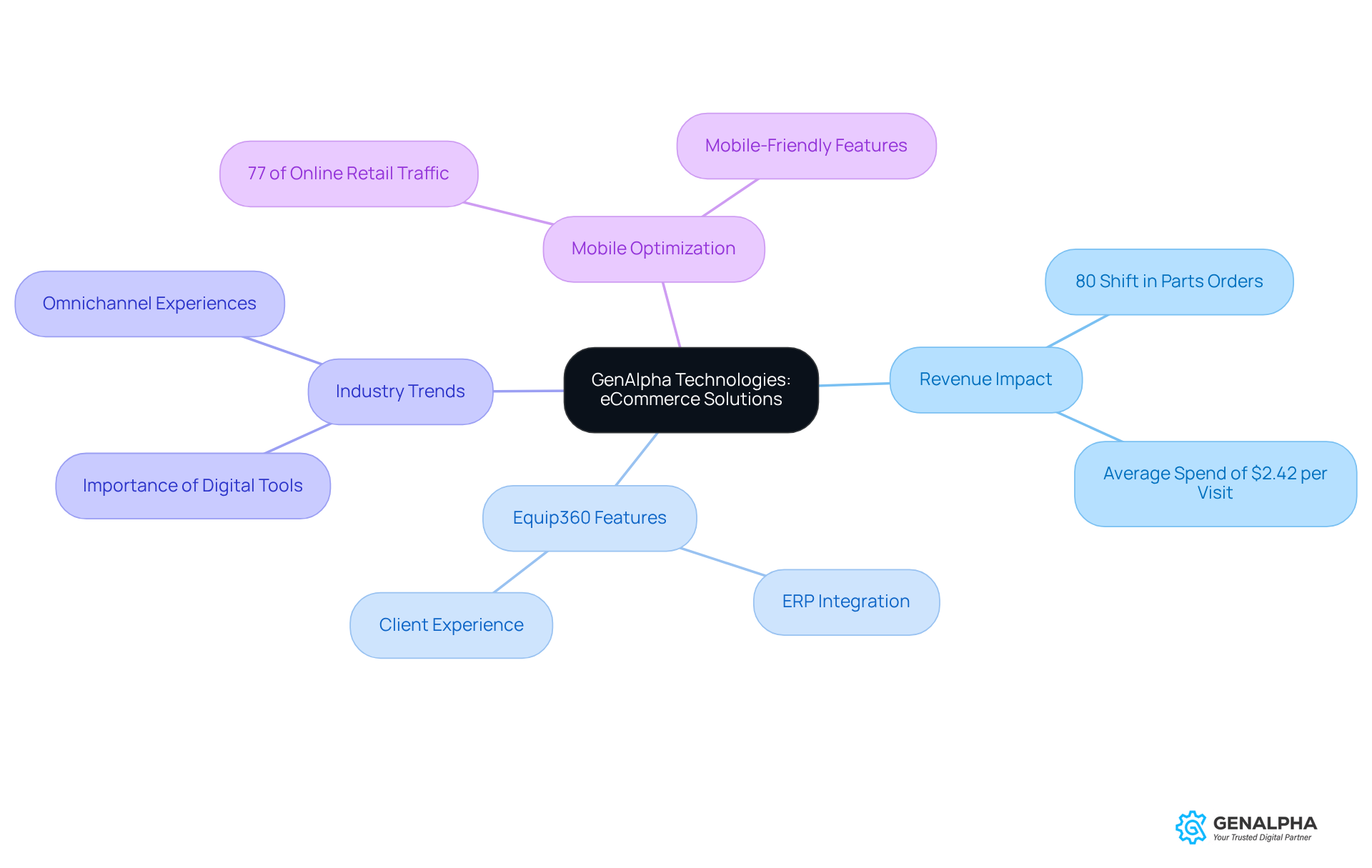
Set Competitive Prices: Analyze Market Trends and Equipment Value
Setting competitive rates is crucial for selling heavy equipment to boost sales and profitability. Have you ever thought about how market research can help? It’s all about examining current trends and the value of similar tools out there. For example, did you know that the heavy construction machinery market is expected to hit $289.86 billion by 2029, growing at a CAGR of 7.2%? This really highlights why competitive pricing strategies are key in the context of selling heavy equipment in a booming market.
Using advanced analytics tools can be a game-changer when it comes to assessing pricing strategies. You want your prices to be appealing while still covering your costs, right? It’s also important to keep an eye on market changes. For instance, auction values for pre-owned heavy-duty construction machinery have dipped by 0.63% month over month. This drop shows how vital it is to be adaptable with your pricing strategies.
Market analysts, like Kurt Ranka, stress the need for a more agile pricing approach in selling heavy equipment that considers fluctuating input costs and changing customer expectations. By staying updated on these trends, you can position your tools advantageously in the market. So, how can you improve your sales results? Let’s keep the conversation going and explore these strategies together!
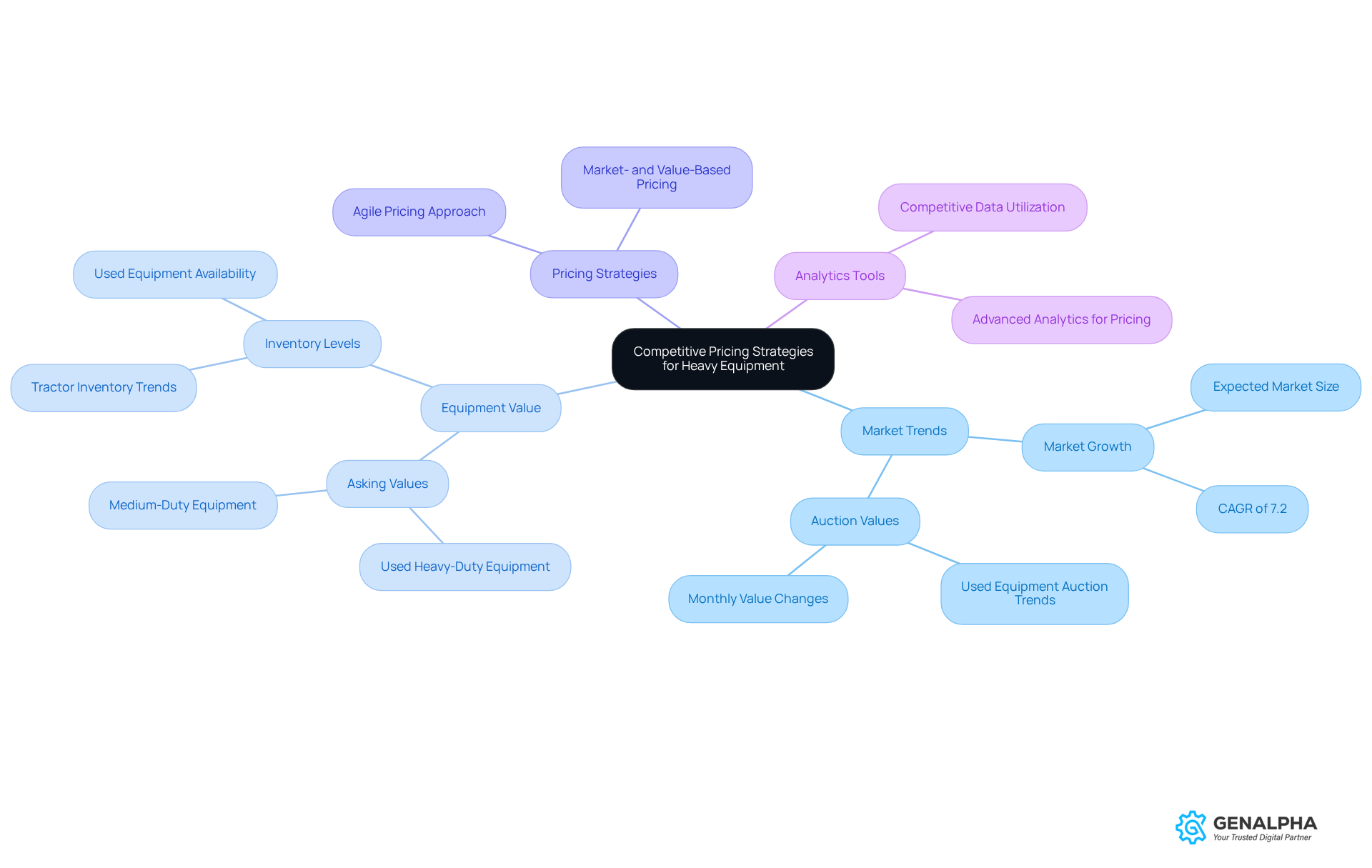
Utilize Online Marketplaces: Expand Your Reach to Potential Buyers
Online marketplaces are a vital way for equipment manufacturers to connect with potential customers for selling heavy equipment. Think about platforms like eBay and MachineryTrader—they allow sellers involved in selling heavy equipment to showcase their machinery to a global audience, which really boosts visibility. By listing products on multiple marketplaces, manufacturers can reach a variety of buyer demographics, which is particularly beneficial when selling heavy equipment to increase sales.
In 2023, the total Gross Merchandise Value (GMV) for the top 100 global online marketplaces hit around $3.485 trillion, showing impressive growth. And guess what? This trend is set to continue, with a projected GMV of $3.832 trillion in 2024. This really highlights how important it is to leverage these platforms to maximize exposure. Successful sellers often stress the importance of having a strong online presence when it comes to selling heavy equipment. As one seller put it, 'Selling heavy equipment effectively involves expanding reach through online platforms to remain competitive in today's market.'
So, how can manufacturers boost their visibility on these platforms? It all starts with optimizing listings for selling heavy equipment—high-quality images, detailed descriptions, and competitive pricing are key. Plus, using data-driven marketing strategies can help target potential customers more effectively, making sure the right audience sees your listings. Incorporating personalized marketing messages, as industry experts suggest, can also significantly enhance engagement and conversion rates.
As the online marketplace landscape evolves, staying updated on emerging trends and consumer behaviors is crucial. For instance, the significant role of China in the global marketplace cannot be overlooked. Finally, manufacturers should think about regularly updating their listings and using analytics to refine their strategies. This way, they can stay competitive and visible in the digital age.
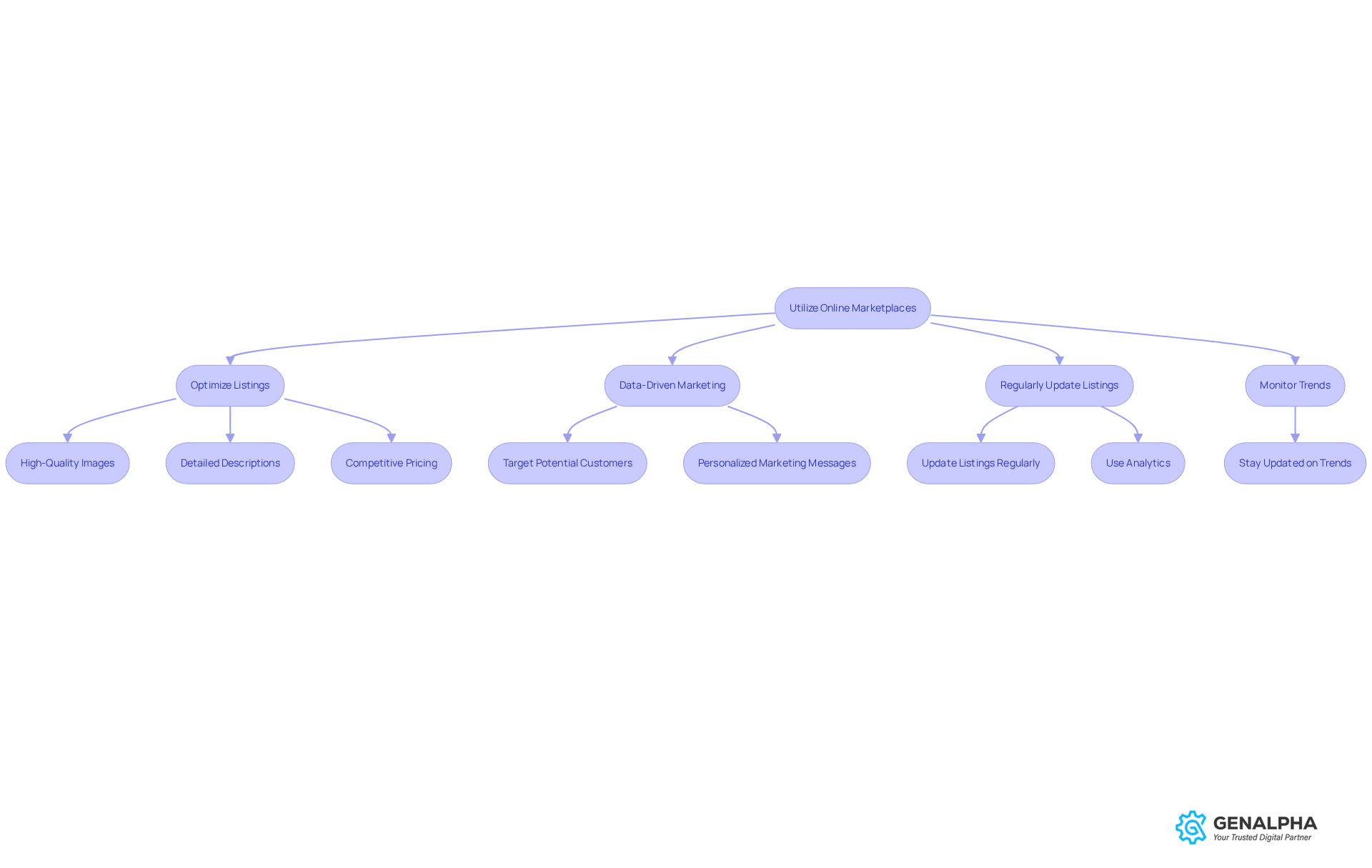
Showcase Equipment Condition: Use High-Quality Images and Detailed Descriptions
In the competitive world of selling heavy equipment, showcasing the condition of your products is key. Did you know that listings with high-quality images get 94% more views than those with lower quality? Plus, they can lead to a 33% higher conversion rate! So, using high-quality images from multiple angles is essential. Detailed descriptions that highlight features, specifications, and maintenance history can really boost buyer confidence. This kind of transparency builds trust and significantly increases the chances of a successful transaction in selling heavy equipment.
As Darren Fradin, VP of Strategic Partnerships and Marketing at Zadoon, puts it, 'In the sector of selling heavy equipment, high-quality photos assist in establishing trust, showcasing the condition of the machine, and ultimately accelerating the transaction process.' High-quality visuals not only convey professionalism but also enhance reliability, making them a vital part of any successful marketing strategy.
For instance, listings that combine thorough descriptions with clear, detailed images consistently outperform those that don’t, leading to quicker transactions and better offers. By investing in professional photography or high-resolution stock images, you can elevate your content quality and create engaging product narratives that attract potential customers and drive transactions while selling heavy equipment.
And don’t forget about the background! Ensuring a neutral, clutter-free background in your product photography can really make your listings pop. Why not consider scheduling a consultation with a professional photographer? They can help assess your current product images and align them with these best practices.

Provide Flexible Payment Options: Cater to Diverse Buyer Needs
To attract a diverse group of buyers, why not think about offering flexible payment options? Imagine how much easier it could be for your customers if they had choices like financing, leasing, or different payment methods such as credit cards, bank transfers, or digital wallets. This kind of flexibility can really simplify the purchasing process and boost your chances of closing those sales. In fact, Daniel Cuervo found that when asked if more payment options lead to increased sales, a whopping 84% of respondents said yes!
Additionally, leasing strategies can help you maintain capital and manage cash flow more effectively. This means your customers can acquire essential assets without the burden of hefty upfront costs. Did you know that about 80% of U.S. companies use some form of equipment financing, including leases? A great example is TechInnovate Solutions, which saw a 15% increase in market share thanks to its leasing strategy.
By tailoring financing solutions to meet your clients’ unique needs, you can build trust and foster long-term relationships that ultimately drive sales growth in a competitive market. So, why not consider consulting with a financial advisor to craft financing options that truly satisfy your clients' requirements?
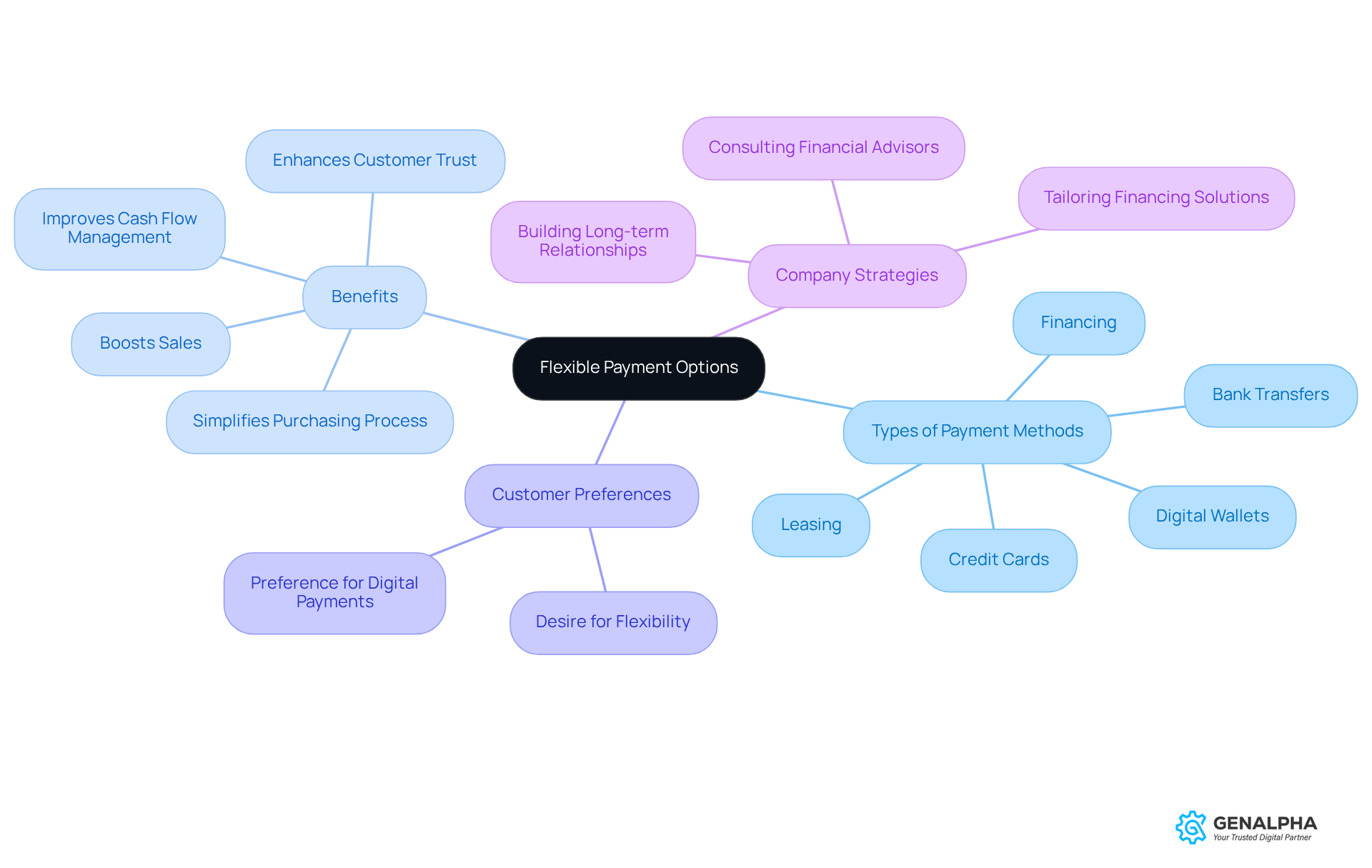
Communicate Effectively: Build Trust Through Direct Engagement
Effective communication is key to building trust with potential buyers when selling heavy equipment in the market. Have you ever thought about how connecting with clients through various channels—like phone calls, emails, and live chat—can make a difference? It ensures that inquiries are handled quickly and accurately. In fact, a staggering 95% of consumers believe that client support is crucial for brand loyalty. This really highlights how important responsiveness and clarity are in our interactions. By providing transparent and honest information about products, businesses can foster rapport and stand out from the competition.
Direct engagement not only boosts client satisfaction but also has a significant impact on sales results. For instance, businesses that focus on effective communication see a 70% rise in client retention when issues are resolved quickly. Plus, 72% of clients are likely to share six or more positive experiences with others, which really enhances the benefits of strong client relationships.
Sales professionals often stress the importance of direct engagement in selling heavy equipment. One sales rep put it perfectly: "When it comes to the client experience, your clients don’t care about how great your product or service is; they care about how you make them feel." This sentiment really drives home the need for businesses to treat client interactions as golden opportunities to build trust and loyalty. Nick Karoglou also mentioned, "Businesses can earn clients' trust by consistently communicating and demonstrating their core values," which reinforces just how vital consistent communication is.
Real-world examples show us how effective direct engagement can be. Take, for example, a well-known tool supplier that introduced a live chat feature on their website. This led to a 50% increase in client inquiries and a 25% boost in conversions. By actively engaging with clients and addressing their concerns in real-time, they not only improved satisfaction but also strengthened their position in the market.
In summary, effective communication through direct engagement is a powerful way to build trust with buyers when selling heavy equipment in the heavy machinery sector. By using different communication channels and putting a spotlight on customer interactions, businesses can enhance their revenue performance and cultivate lasting relationships. So, how are you planning to improve your client engagement strategy?
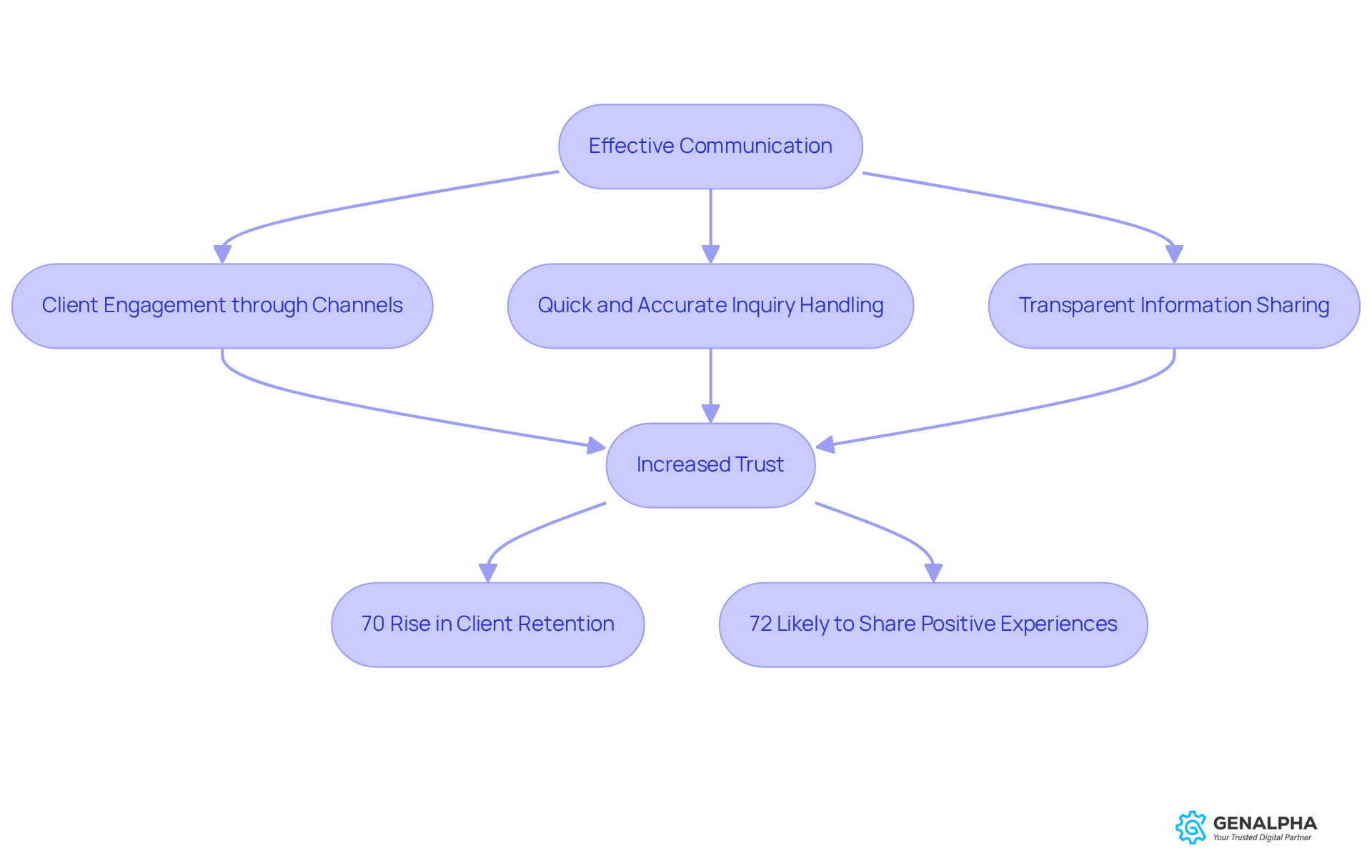
Explore Consignment Sales: Leverage Third-Party Expertise
Have you ever considered how exploring consignment transactions could revolutionize selling heavy equipment? By teaming up with third-party sellers who have established networks and industry know-how in selling heavy equipment, you can significantly boost your reach to potential buyers. This partnership not only lightens the load when it comes to selling heavy equipment but also opens up a world of new business opportunities.
Successful consignment sellers often highlight how crucial it is to tap into third-party expertise. They’ve seen firsthand how these collaborations can lead to better visibility and higher prices, thanks to the competitive bidding that often comes into play. Plus, with the current trends showing a growing reliance on digital platforms for consignment transactions, sellers can access broader markets and really optimize their operations.
So, by effectively utilizing third-party sellers, you can enhance your sales strategy. Imagine ensuring that your products not only reach the right audience but also maximize your return on investment. Why not consider this approach to elevate your selling game?
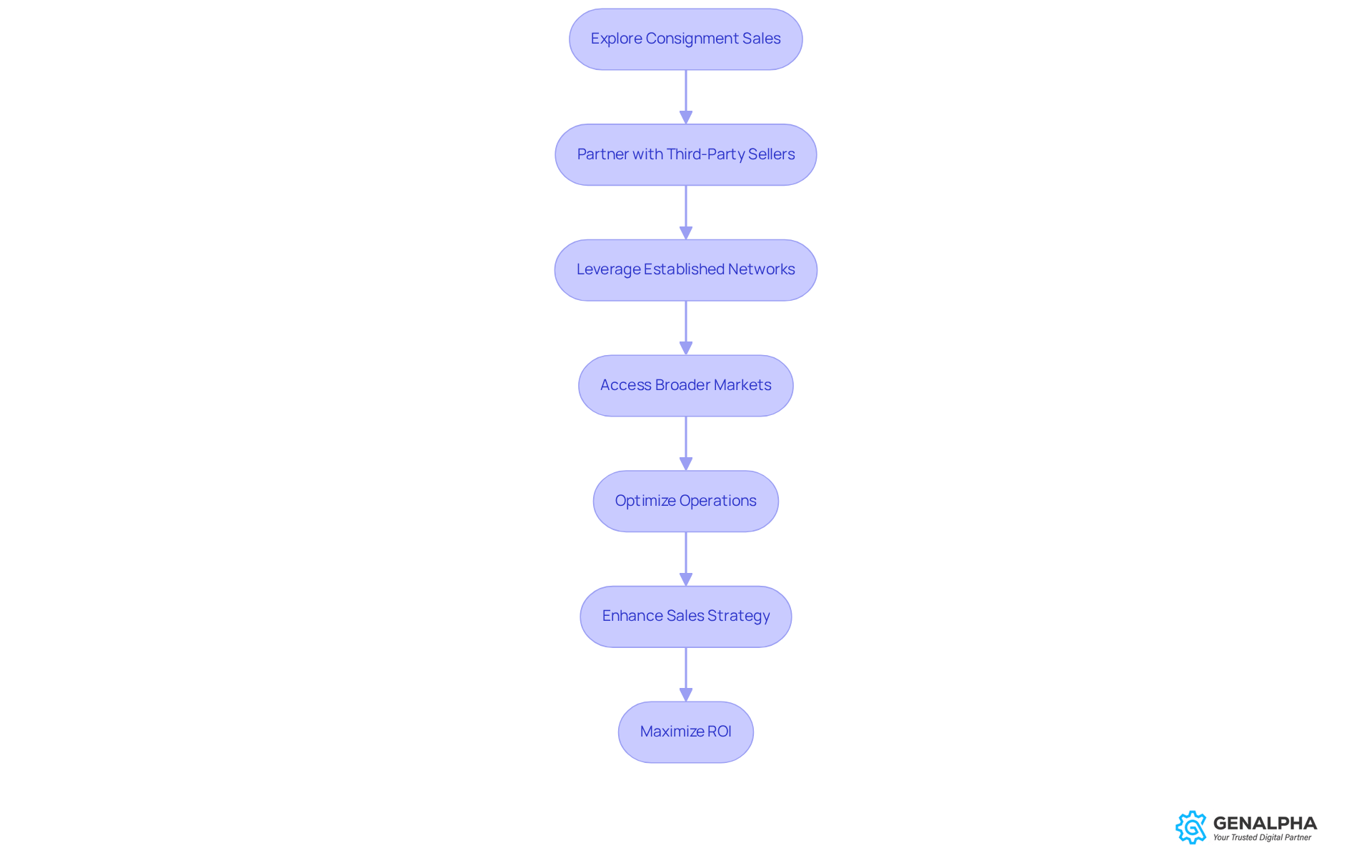
Participate in Auctions: Create Urgency and Competitive Bidding
Have you ever felt that rush of excitement when participating in an auction? It’s that sense of urgency and friendly rivalry that can really get the adrenaline pumping. By selling heavy equipment in reputable auctions, you’re not just putting it out there; you’re attracting serious bidders who are eager to compete.
Imagine the thrill of watching those bids rise! This competitive atmosphere can lead to higher sale prices and quicker transactions in selling heavy equipment. Sounds great, right? It’s a win-win that can really boost your overall sales strategy in selling heavy equipment. So, why not take the plunge and see what auctions can do for you?
Address Liability Concerns: Ensure Transparency and Trust
Addressing liability concerns is super important for building trust with potential customers. Being transparent about your equipment's condition, including any warranties or guarantees, is key. When you clearly communicate liability terms, it can really ease customer worries, making them feel confident about moving forward with their purchase.
For example, when items are sold at auction, they’re usually offered on an 'as-is, where-is' basis. This means there are no guarantees about their condition. It highlights how essential it is for buyers to thoroughly check out items before placing a bid—whether that's in person or through detailed descriptions and images.
By being upfront about the item's condition, those selling heavy equipment not only protect themselves from post-sale liability but also build trust with buyers, which is especially crucial in high-value transactions. Legal experts emphasize that being open in equipment dealings isn’t just a good practice; it’s a vital part of creating a dependable relationship with buyers.
Ultimately, the effect of transparency on buyer trust can lead to smoother transactions and boost sales efficiency. So, how transparent are you with your customers? It's time to reflect on that and consider how you can enhance your approach!
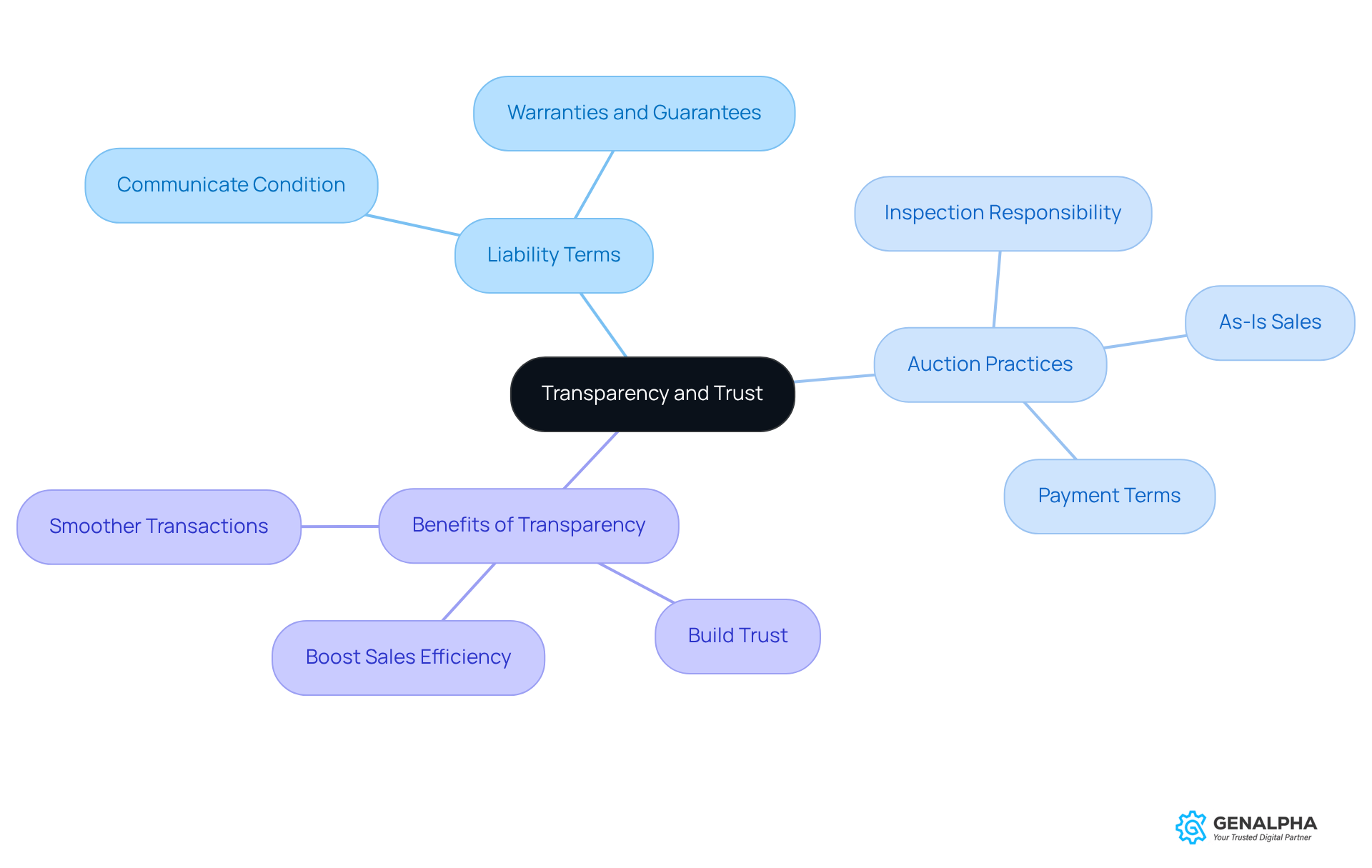
Conclusion
Selling heavy equipment effectively is all about a multifaceted approach that blends technology, market awareness, and strong customer relationships. Think about it: leveraging eCommerce solutions like GenAlpha Technologies' Equip360 platform can really boost your online sales capabilities and streamline operations. By adopting these digital tools, businesses can not only ramp up their revenue but also meet the evolving expectations of today’s buyers.
So, what are the key insights here?
- Competitive pricing
- Effective communication
- Showcasing equipment condition through high-quality images and detailed descriptions
Utilizing online marketplaces can expand your reach, and offering flexible payment options caters to diverse buyer needs. Plus, engaging directly with clients fosters trust, and exploring consignment sales can tap into third-party expertise for greater visibility. And don’t forget about auctions—they create urgency and competitive bidding, which can really enhance your sales opportunities.
In conclusion, the heavy equipment market is brimming with potential for growth, especially for those ready to adapt and innovate. By embracing these proven strategies, businesses not only position themselves for success but also underscore the importance of trust, transparency, and customer engagement in building lasting relationships. As the landscape continues to evolve, let’s remain proactive in refining our approaches, ensuring we stay competitive and responsive to market demands. What steps will you take next to elevate your sales game?
Frequently Asked Questions
What eCommerce solutions does GenAlpha Technologies offer for the heavy equipment sector?
GenAlpha Technologies offers a suite of eCommerce solutions, including the Equip360 platform, which enhances online transaction capabilities, streamlines inventory management, and elevates client experiences for manufacturers and distributors in the heavy equipment sector.
How can Equip360 impact revenue for heavy equipment producers?
Equip360 can significantly impact revenue by enabling producers to shift up to 80% of parts orders to online channels within a year of implementation, thus boosting sales workflows and improving conversion rates.
Why is mobile optimization important for eCommerce in the heavy equipment industry?
Mobile devices account for 77% of online retail traffic, making mobile optimization crucial for enhancing user experience and meeting the growing demand for omnichannel experiences among B2B buyers.
What role does market research play in setting competitive prices for heavy equipment?
Market research helps assess current trends and the value of similar tools, which is essential for setting competitive prices, especially in a growing market projected to reach $289.86 billion by 2029.
How can advanced analytics tools assist in pricing strategies for heavy equipment?
Advanced analytics tools help assess pricing strategies by providing insights into market changes and enabling manufacturers to adapt their prices to remain appealing while covering costs.
What are the benefits of utilizing online marketplaces for selling heavy equipment?
Online marketplaces like eBay and MachineryTrader allow manufacturers to showcase their machinery to a global audience, increasing visibility and connecting with diverse buyer demographics.
What strategies can manufacturers use to optimize their listings on online marketplaces?
Manufacturers should use high-quality images, detailed descriptions, competitive pricing, and data-driven marketing strategies to enhance their listings and target potential customers effectively.
Why is it important for manufacturers to stay updated on emerging trends in online marketplaces?
Staying updated on trends and consumer behaviors is crucial for manufacturers to remain competitive and visible in the digital age, especially given the significant role of global markets like China.




